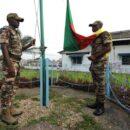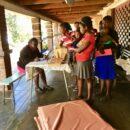Zimbabwe 2013: By hook or by crook Mugabe is likely to win, get used to it – By Simukai Tinhu


Has Morgan Tsvangirai been outmanoeuvred by Robert Mugabe once again in the dog-eat-dog world of Zimbabwean politics?
This Wednesday, Zimbabweans begin the process of voting in their much-analysed General Election. This latest chapter in teh country’s exhausting political scene follows the Constitutional Court’s ruling that elections must be held by the end of this month. In compliance with the ruling, President Robert Mugabe declared 31st July as the election date, enraging opposition and pro–democracy forces who argued that more time was needed to ensure that political and electoral reforms were undertaken.
In objection, the Movement for Democratic Change (MDC) formations successfully lobbied the regional body of Southern African Development Community (SADC), which in turn encouraged President Mugabe to seek an extension via the court. However, the same Constitutional Court upheld its initial ruling, paving the way for rushed elections that President Mugabe’s Zimbabwe African National Union–Patriotic Front (ZANU–PF) had always wanted.
The opposing sides, as usual, are represented by President Mugabe of ZANU–PF, pitted against his Prime Minister in the coalition government, Morgan Tsvangirai of the MDC. Captivating to some, and confusing to many, this political fight between the two old rivals will not only mark the end of the tumultuous transition period that had been hastily put together in the aftermath of the bloody elections of 2008, but is also certainly the last for these two arch enemies.
In the coalition government, ZANU–PF and the MDC have become polarised – each viewing the other’s moves as an illegitimate way to consolidate their position ahead of the elections. For example, the MDC has accused ZANU–PF of blocking the necessary political and electoral reforms and also attempting to subvert the will of the people by manipulating the electoral outcome even before the first ballot has been cast. On the other hand, ZANU–PF has alleged that the MDC has been attempting to unbalance local politics by bringing in external interference in the form of SADC and western countries.
But it appears that President Mugabe, once again, may have displayed his characteristic cunning in outmanoeuvring his opponents. For example, he has used his time in the coalition government to implement repressive laws in order to prevent other political parties from growing and directly challenging his rule. In addition, voter registration throughout the country has been done in a manner that is likely to ensure a favourable outcome for ZANU–PF.
Indeed, this election is not about entrenching democracy, it is about ZANU–PF retaining power. If Zimbabwe was ever to have a chance at having a democratic election, that moment passed on the 15th March when a flawed constitution was passed – a constitution that President Mugabe has used to further undermine his coalition partners in the Government of National Unity (GNU).
No Political Violence
Much has been said about this election being characterised by non-violence. There are two reasons: Firstly, ZANU–PF is confident of winning a free and fair elections.
Secondly, the violence of 2008 created a crisis of legitimacy, which President Mugabe is trying to avoid. In other words, the motivation for desisting from violence has little to do with ZANU–PF’s goodwill, but it is in the interest of President Mugabe’s party and is a threshold for courting international legitimacy that was lacking following the 2008 election.
However, in the event of a runoff, with ZANU–PF’s grip on power being seriously threatened, it would not be surprising if a political environment reminiscent of 2008 emerged, where political violence characterised the run-off vote. Indeed, the organisations that have been used to perpetrate violence are still intact, and ready to go.
What is the Likely Outcome?
Political predictions are not an exact science. The margin of error in calculations is large, so the best we can do is to proffer scenarios that are likely to emerge at the end of the elections.
The first possible scenario is that President Mugabe loses with the octogenarian leader conceding and handing over power to his long-time adversary. For this scenario to materialise, the MDC has to achieve a resounding victory – one which ZANU–PF cannot manipulate. However, with the only polls done to date showing that Prime Minister Tsvangirai’s support has never been greater than that of President Mugabe since 2012, this scenario is unlikely. Earlier this year, Mugabe warned he would fight like a “˜wounded beast’ to avoid defeat.
The second possible scenario is that Tsvangirai wins with a small margin that still avoids a run-off. In the event of such an outcome, the MDC is likely to be forced to negotiate with ZANU–PF to create some kind of coalition government or cede some power to ZANU-PF.
ZANU–PF is entrenched in the power structures of the state, notably the civil service, judiciary and security sector. Some sections of the security establishment have made it abundantly clear that they have no intention of abrogating their ties with ZANU–PF and they could make it extremely difficult for the MDC to govern if they choose to go it alone.
The third scenario is that ZANU–PF retains political power either through a genuine win or manipulation of the electoral outcome. To date, all the evidence points to this scenario. ZANU–PF support has surged in the last two years as indicated by the surveys done by Afrobarometer and Freedom House more than a year ago. These show that President Mugabe’s support has increased at the expense of that of the MDC. Though these surveys are relatively old, and might not necessarily be accurate, the danger of the existence of such surveys is that they can be used by President Mugabe to justify a rigged electoral outcome. In other words, it is not what the surveys are saying, but what they can be used for.
In addition, in the event of the opposition crying foul, ZANU–PF is likely to point to the massive turn out in its primary elections. During internal elections to choose parliamentary candidates, ZANU–PF supporters turned to vote in their thousands as compared to a disappointing turnout for the MDC. President Mugabe’s party has also had huge turn outs at political rallies held in MDC strongholds such as Mutare, Bulawayo and Chitungwiza. Amid allegations that a lot of the supporters are simply being moved from one campaign rally to the other, what matters to ZANU–PF is to use those images to justify a rigged result.
The unequal playing field has also not worked in favour of the MDC. For example, the state radio and TV station have remained firmly in the hands of President Mugabe’s party – being used for ZANU–PF propaganda and hate speech against the MDC. On one occasion, when the MDC requested having one of its rallies covered by state TV, the broadcaster requested US$165 000 (it is not known if ZANU–PF is paying the same).
The opposition is also entering this election divided. The MDC’s failure to reunite with the smaller faction led by Welshman Ncube will see them lose ground in the Matabeleland and Midlands regions where Welshman Ncube’s party has been gaining support. The main MDC party is also itself divided particularly in the Manicaland region, one of its strongholds, where Prime Minister Tsvangirai’s attempts to impose Dawn/Mavambo/Kusile candidate Simba Makoni has seen the Prime Minister being defied by his senior officials in the region.
Most worrying has been lack of interest by the international community, in particular, US and EU and other Western countries, in this year’s election, causing Tsvangirai to complain that his party has been let down by the international community. The western Blind Eye has given ZANU–PF wide latitude to manipulate the election if they so choose. Also, the lack of interest in elections has seen the media’s once hagiographic depiction of the MDC leader being replaced by apathy and in some case even hostility (New York Times and Guardian Articles).
Nor have observer missions from these countries been invited. The few international observer missions invited by the government are from friendly countries such as Russia, Cuba and China, and these are likely to endorse an electoral outcome that favours President Mugabe. The United Nations has also been banned, and the only international organisations that have been invited are SADC and AU, and these have already expressed some kind of satisfaction with electoral preparations that the MDC sees as flawed.
Until recently, President Jacob Zuma of South Africa was seen as the only international leader who had the capability and leverage to press for a free and fair election. However, this seemed not to be case after some sharp tongued criticism of his handling of the “˜Zimbabwe crisis’ by ZANU–PF officials. Indeed, by reining on his international relations advisor Lindiwe Zulu, who was critical of the election preparations in Zimbabwe, President Zuma has been seen as giving ZANU–PF the licence to steal the election.
In the event of a disputed result it is difficult to see how things would go in the MDC’s favour. They would most likely appeal to the courts, but judging by the composition of the judiciary and also historical rulings by the Supreme Court (almost always favouring ZANU–PF); it’s likely that the opposition would lose any appeal. Many of the judges allegedly benefit from ZANU–PF patronage networks and also have been on the sanctions list which they blame on the MDC.
There is a possibility of protests arising if the election is perceived as stolen. This again is an unlikely scenario, considering heavy handedness in which the state security sector has handled protestors in previous elections. Others have talked about the pressure from the international community, which again is unlikely considering that the West’s political class and media having shown virtually no interest in this year’s election.
The AU has basically passed on a clean bill of health regarding electoral preparations, with AU Chief Dr Dhlamini–Zuma, and SADC’s point man appearing to have been neutered by ZANU–PF criticism. Out of desperation, Tsvangirai has threatened to declare himself President, an extra legal process that ZANU–PF will take as an opportunity to incarcerate him. President Mugabe warned over the weekend that the MDC leader would be arrested were such a development to occur.
It appears that all is set for ZANU–PF to retain power. In Zimbabwean politics “˜winning elections’ is not about making a case for your side, it is about destroying the rival and his potential. And that’s what ZANU– PF has systematically done since they entered into the coalition government. While opposition parties and candidates were using all kinds of strategic and tactical options to attract voters, ZANU–PF was using all the tricks in its political playbook to ensure that all those voters attracted either will not vote or if they do cast their votes, they will not count.
President Mugabe’s hold on power is pretty tight and will not be easily broken. That’s unfortunate, but it does not do anyone any favours to pretend otherwise. Sometimes the hardest thing of all is to see what is really there.
Simukai Tinhu is a political analyst based in London.







Compromised–July 31 Election in Zimbabwe
When an election “is seriously compromised” [comment by several Independent Observer Groups expressing concern in that thousands of eligible voters were disenfranchised for perhaps not supporting the status quo ] which is now becoming most apparent in the July 31/13 national election in Zimbabwe. The salient issue is: What can the International Community of Civic Good Governance Electoral Advisors do in addressing this combustive technical and public policy concern in persuading the Zimbabwe Election Commission to step up and take full civic electoral responsibility in investigating these profound allegations of electoral fraud?
Monte McMurchy